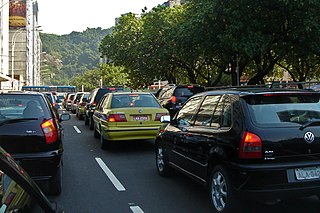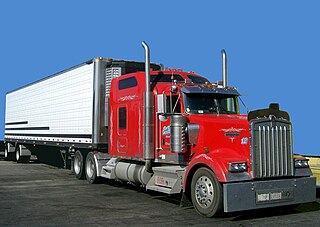Drunk driving is the act of operating a motor vehicle with the operator's ability to do so impaired as a result of alcohol consumption, or with a blood alcohol level in excess of the legal limit. For drivers 21 years or older, driving with a blood alcohol concentration (BAC) of 0.08% or higher is illegal. For drivers under 21 years old, the legal limit is lower, with state limits ranging from 0.00 to 0.02. Lower BAC limits apply when operating boats, airplanes, or commercial vehicles. Among other names, the criminal offense of drunk driving may be called driving under the influence (DUI), driving while intoxicated or impaired (DWI), operating [a] vehicle under the influence of alcohol (OVI), or operating while impaired (OWI).

In the United States, a Department of Motor Vehicles (DMV) is a state-level government agency that administers vehicle registration and driver licensing. Similar departments exist in Canada under different names. The name "DMV" is not used in every state or area, nor are the traditional DMV functions handled by a single agency in every state, but the generic term is widely understood, particularly in the context of driver's license issuance and renewal.
Vehicle insurance is insurance for cars, trucks, motorcycles, and other road vehicles. Its primary use is to provide financial protection against physical damage or bodily injury resulting from traffic collisions and against liability that could also arise from incidents in a vehicle. Vehicle insurance may additionally offer financial protection against theft of the vehicle, and against damage to the vehicle sustained from events other than traffic collisions, such as keying, weather or natural disasters, and damage sustained by colliding with stationary objects. The specific terms of vehicle insurance vary with legal regulations in each region.

The standard Safe Practices for Motor Vehicle Operations, ANSI/ASSE Z15.1, defines defensive driving skills as "driving to save lives, time, and money, in spite of the conditions around you and the actions of others." This definition is taken from the National Safety Council's Defensive Driving Course. It is a form of training for motor vehicle drivers that goes beyond mastery of the rules of the road and the basic mechanics of driving. Its aim is to reduce the risk of collision by anticipating dangerous situations, despite adverse conditions or the mistakes of others. This can be achieved through adherence to a variety of general guidelines, such as following the assured clear distance ahead and two second rules, as well as the practice of specific driving techniques. Some motorists describe defensive driving as "driving as if everyone else on the road were drunk."

Road rage is aggressive or angry behavior exhibited by motorists. These behaviors include rude and verbal insults, physical threats or dangerous driving methods targeted toward another driver or non-drivers such as pedestrians or cyclists in an effort to intimidate or release frustration. Road rage can lead to altercations, damage to property, assaults and collisions that result in serious physical injuries or even death. Strategies include long horn honks, swerving, tailgating, brake checking, and attempting to fight.

A driving test is a procedure designed to test a person's ability to drive a motor vehicle. It exists in various forms worldwide, and is often a requirement to obtain a driver's license. A driving test generally consists of one or two parts: the practical test, called a road test, used to assess a person's driving ability under normal operating conditions, and/or a written or oral test to confirm a person's knowledge of driving and relevant rules and laws.

A traffic ticket is a notice issued by a law enforcement official to a motorist or other road user, indicating that the user has violated traffic laws. Traffic tickets generally come in two forms, citing a moving violation, such as exceeding the speed limit, or a non-moving violation, such as a parking violation, with the ticket also being referred to as a parking citation, or parking ticket.

A commercial driver's license (CDL) is a driver's license required to operate large, heavy, or placarded hazardous material vehicles in commerce.
Graduated driver licensing systems (GDLS) are designed to provide new drivers of motor vehicles with driving experience and skills gradually over time in low-risk environments. There are typically three steps or stages through which new drivers pass. They begin by acquiring a learner's permit, progress to a restricted, probationary or provisional license, followed by receipt of a full driver's license. Graduated drivers' licensing generally restricts nighttime, expressway, and unsupervised driving during initial stages, but lifts these restrictions with time and further testing of the individual, eventually concluding with the individual attaining a full driver's license.

Driver's education, driver education, driving education, driver's ed, or driving tuition or driving lessons is a formal class or program that prepares a new driver to obtain a learner's permit or driver's license. The formal class program may also prepare existing license holders for an overseas license conversion or medical assessment driving test or refresher course. It may take place in a classroom, in a vehicle, online, or a combination of the above. Topics of instruction include traffic code or laws and vehicle operation. Typically, instruction will warn of dangerous conditions in driving such as road conditions, driver impairments, and hazardous weather. Instructional videos may also be shown, demonstrating proper driving strategies and the consequences for not observing the rules.
A driver's permit, learner's permit, learner's license or provisional license, is a restricted license that is given to a person who is learning to drive, but has not yet satisfied the prerequisite to obtain a driver's license. Having a learner's permit for a certain length of time is usually one of the requirements for applying for a full driver's license. To get a learner's permit, one must typically pass a written permit test, take a basic competency test in the vehicle, or both.
Many countries have adopted a penalty point or demerit point system under which a person’s driving license is cancelled or suspended based on the number of points accumulated by them over a period of time because of the traffic offences or infringements committed by them in that period. The demerit points schemes of each jurisdiction varies. These demerit schemes are usually in addition to fines or other penalties which may be imposed for a particular offence or infringement, or after a prescribed number of points have been accumulated.

The New Jersey Motor Vehicle Commission is a governmental agency of the U.S. state of New Jersey. The equivalent of the department of motor vehicles in other states, it is responsible for titling, registering and inspecting automobiles, and issuing driver's licenses.

In the United States, driver's licenses are issued by each individual state, territory, and the District of Columbia rather than by the federal government due to federalism. Drivers are normally required to obtain a license from their state of residence and all states recognize each other's licenses for non-resident age requirements. There are also licenses for motorcycle use. Generally, a minimum age of 16 is required to obtain a drivers/M1 license. A state may also suspend an individual's driving privilege within its borders for traffic violations. Many states share a common system of license classes, with some exceptions, e.g. commercial license classes are standardized by federal regulation at 49 CFR 383. Many driving permits and ID cards display small digits next to each data field. This is required by the American Association of Motor Vehicle Administrators’ design standard and has been adopted by many US states. According to the United States Department of Transportation, as of 2018, there are approximately 227 million licensed drivers in the United States.
Online traffic school refers to a traffic school course that is completed over the Internet. These courses are similar in content to a traditional classroom traffic school course; however, online / internet traffic school allows the student to complete the course on his own time and at his own pace. Internet traffic school programs were born out of the concept of “home-study” traffic school and the increasing popularity of the Internet for varied testing environments.
In the United States, an SR-22 is a vehicle liability insurance endorsement required by most state Department of Motor Vehicles (DMV) offices for "high-risk" drivers.
The Driver's Privacy Protection Act of 1994, Title XXX of the Violent Crime Control and Law Enforcement Act, is a United States federal statute governing the privacy and disclosure of personal information gathered by state Departments of Motor Vehicles.

A driver's licence is a legal authorization, or the official document confirming such an authorization, for a specific individual to operate one or more types of motorized vehicles—such as motorcycles, cars, trucks, or buses—on a public road. Such licenses are often plastic and the size of a credit card.

The Motor Vehicles Act is an Act of the Parliament of India which regulates all aspects of road transport vehicles. The Act provides in detail the legislative provisions regarding licensing of drivers/conductors, registration of motor vehicles, control of motor vehicles through permits, special provisions relating to state transport undertakings, traffic regulation, insurance, liability, offences and penalties, etc. For exercising the legislative provisions of the Act, the Government of India made the Central Motor Vehicles Rules 1989.
Traffic School by Improv is an American company that provides behavior-based driver education, traffic school, defensive driving programs, and workplace safety courses. The company employs the educational entertainment "edutainment" approach to teaching, which combines education with entertainment. The company claims that some of their courses "have shown a statistical improvement in reducing crashes and moving violations."










